NRL player agents have gone unregulated for far too long: Paul Kent
They are the faceless men who have become used to bending NRL boards and coaches to their will. Paul Kent lifts the lid on rogue player managers and reveals why their leash is about to be tightened.
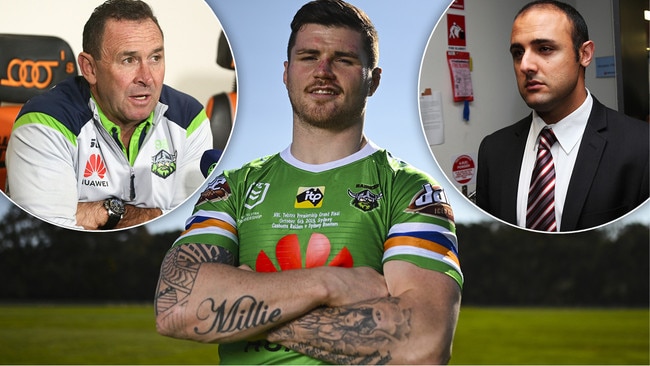
Opinion
Don't miss out on the headlines from Opinion. Followed categories will be added to My News.
Every time I write about managers a manager calls and says “We’re not all bad guys” and, such is his earnest delivery, I always sit back for at least a good five minutes and believe all managers are good guys.
Even though the feeling gently passes, managers remain some of my favourite people.
They carry an outlook on life smoothed down by repeated losses, kind of like old horse players at the track. They are men used to putting a dollar in one pocket and taking two dollars out of the other, sometimes even their own.
Kayo is your ticket to the 2020 NRL Telstra Premiership. Every game of every round Live & On-Demand with no-ad breaks during play. New to Kayo? Get your 14-day free trial & start streaming instantly >

Right now the NRL is investigating ways to corral the managers and provide more transparency to a part of the business that has gone unregulated for far too long.
It gained a little heat this week when John Bateman’s manager Isaac Moses, currently deregistered at the NRL, put out a statement saying he was merely doing what was best for his client after the Raiders agreed to release Bateman a year into his contract because other clubs were willing to pay Bateman more money.
There is business and there is business, though.
Moses’s claims to be doing good business for his client has suffered a blow with it emerging Friday that Bateman now looks most likely to return to England after the two clubs said to be interested, Canterbury and St George Illawarra, cooled because of his “shoulder injuries” and this current media storm.
NRL clubs are wary of potentially being treated the same as the Raiders.
Bateman has outsmarted himself.
Meanwhile, the Raiders have proven a new truth; clubs can no longer do good deals with players.
In Bateman’s case, for example, they negotiated to pay Bateman’s $200,000 transfer fee to Wigan and then pay Bateman $580,000 a season on top of that.
Untried in the NRL, it was a gamble the Raiders thought worth taking.
By finals time it looked like the Raiders had done a first class deal. Bateman was the Dally M second-rower of the year and a key part of Canberra’s surge, which took them all the way to the grand final.
By grand final time, though, Bateman had fired his manager in England and hired Moses, whose first point of business when the Raiders wanted to show how pleased they were with Bateman’s form by offering him an upgrade to $750,000, was to utter “You’re getting closer.”
Sadly for Bateman, that was as close as the Raiders would go.
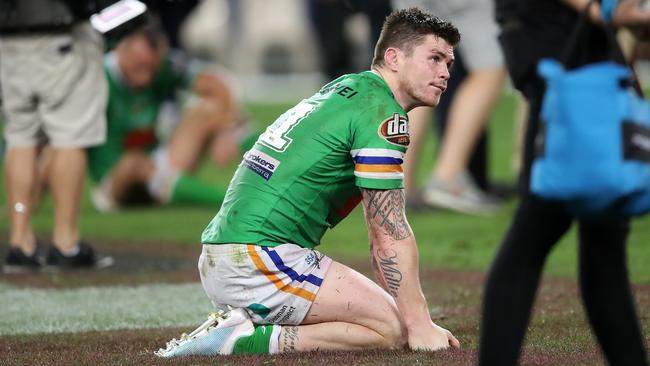
The NRL is investigating ways to regulate managers and stop this wild west approach where signed contracts are merely a negotiating ploy.
Where Bateman erred was he ran into the club boss, Don Furner, who has been around this game longer than any other chief executive and certainly long enough to know when something has a stink to it.
Furner had the integrity to see Bateman’s ploy for what it was and refuse to entertain it.
This is very serious business.
My favourite was when a club battling to make the finals got a phone call one chilly winter afternoon and what followed was an honest inquiry as to whether this club, which was not particularly good, was interested in a journeyman playmaker plying his trade at another club.
This offer confused the club greatly.
Admittedly, they were willing to concede, they were not travelling, but one of the few good boasts they could make was that they had a regular Test playmaker in their ranks, the very position for which they were now being offered.
Why would they trade him out for a journeyman in the same position?
It took for the chief executive only a short conversation with the coach down the hallway to understand.
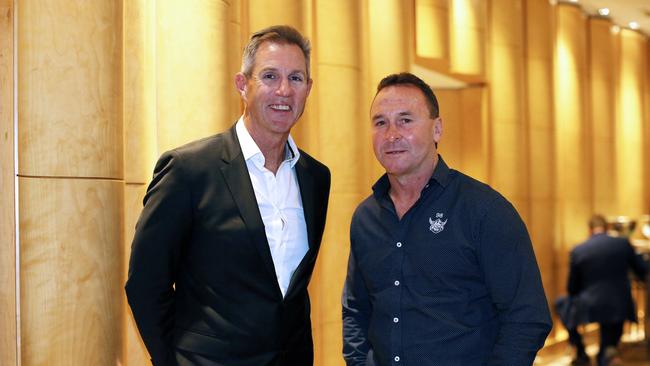
The manager had a six-per-cent interest in both playmakers and was trying to get his Test player into the good club, to hopefully win the premiership, but needed to first get them interested in the journeyman otherwise the trade could not go ahead.
Alas, that was as far as the conversation went, the wet behind the ears club boss having no idea how close he came to being stripped naked in public.
Now, managers have stumbled upon another, almost foolproof, method to make the same trade.
They simply inform the player who wants out to kick stones at training until the coach slumps his shoulder in defeat and tells the club boss to trade him out, such is the negative effect he is having on his teammates mood.
The industry needs to be regulated.
Some years back a representative front-rower was on the market and his manager was in deep negotiation with a rival club.
Good props are the magic dust in a team looking to find the next level.
Ultimately, though, the prop knocked back the offer and all was well and good until a few weeks later when the prop came up against the team that pursued him and saw the rival coach.
“Sorry,” the prop said, “I just couldn’t find it in myself to leave.”
“I don’t have a problem with that,” said the coach, “I just can’t believe you knocked back $750,000.”
“What?”
Just a little detective work was required to determine the final offer was never delivered to the prop.
It was not passed on because, most now believe, the manager had other players at the club whose commission proved greater and he was intent on helping deliver them, and the club, a premiership.
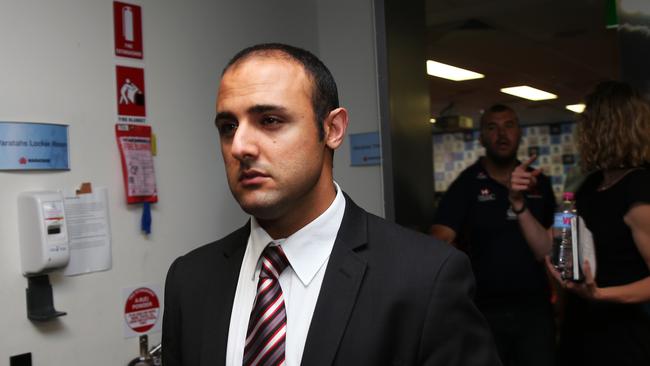
Last year a manager stood up and told a club board he wanted his coach to get a two-year extension and that he was leaving the boardroom for three minutes.
If he returned and the extension was not on the table then he was taking his four best players out of the club.
These are some of the reasons the NRL must begin to regulate player managers as, it must be said, there are some very good ones among them.
I was in one manager’s office when he called his player one morning and told him he had just sold one of his investment homes.
The manager had power of attorney for the player and bought him a house, used it as a tax write-off for him for little more than a year, then sold it when the market was up.
The player was richer by six-figures without doing a thing.
One manager had a rep prop crying on his floor in the foetal position one day, the player vulnerable and confused and in the only place he felt safe.
The manager sat with him through most of the afternoon, nursing him around, until the player finally felt able to leave the office and climb back into the real world.
Like real estate agents, car salesmen, lawyers and even the odd sportswriter, these are reputations widely held if not always fair.
Still, it goes on.
One player was surprised to learn one day that his deal at his club included a $60,000 payment that was not, what you would call, in the books. In fact, the payment was completely under the table.
He suffered no case of conscience, though.
At the same time he learned of the payment he also learned the incentive was split evenly down the middle, $30,000 going to the club’s recruitment guy, who organised the payment, and $30,000 to his manager, who agreed to it.
He sacked his manager after that which, all things considered, was only fair.
MORE NEWS
Why Bateman’s embarrassment can be a wake-up call for Cotric
Roosters urged to be better despite ‘game of the year’
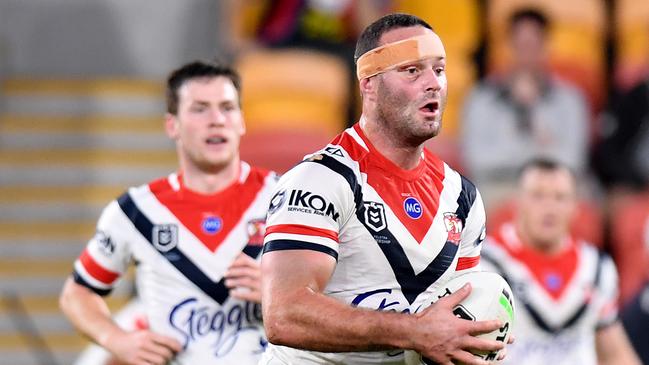
Bravery is a celebrated part of this game, and rightly so.
Boyd Cordner will never have anyone doubting his bravery for as long as he plays the game, for as long as he walks after every performance with blood leaking from somewhere and skin scraped from somewhere else.
Cordner is one of those players who gives so much during a game that, like Jake Trbojevic, if you only saw him walking off the field after the game you would not be able to tell by his appearance whether he won or lost.
The effort never changes, win or lose.
In one of the great injustices Cordner’s bravery cost his team Thursday night.
Taking the ball up in extra time, Cordner hit his head as he was slammed on the ground and, in a bid to show he was not injured and escape being sent for a head injury assessment, and being removed from the end of the game, Cordner rushed to play the ball and wobbled and fumbled it as he stood up.
It was a shattering end to a magnificent game. The Storm got the ball in good field position and kicked the winning penalty in the next set.
Cordner’s injury was unfortunate and something that sometimes happens in sport, and the result was no fault of his own.
Both sides were out on their feet and showed how tremendous the game is when played at its best.
It might also be the best endorsement yet for what fatigue can do to a game and how it can enhance it.
Originally published as NRL player agents have gone unregulated for far too long: Paul Kent

